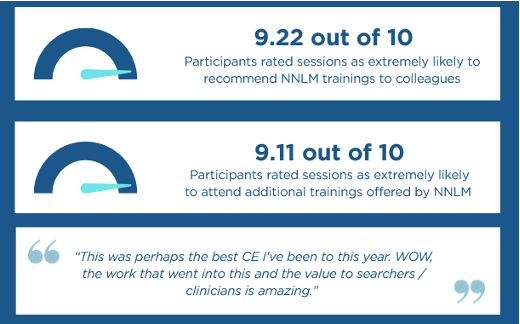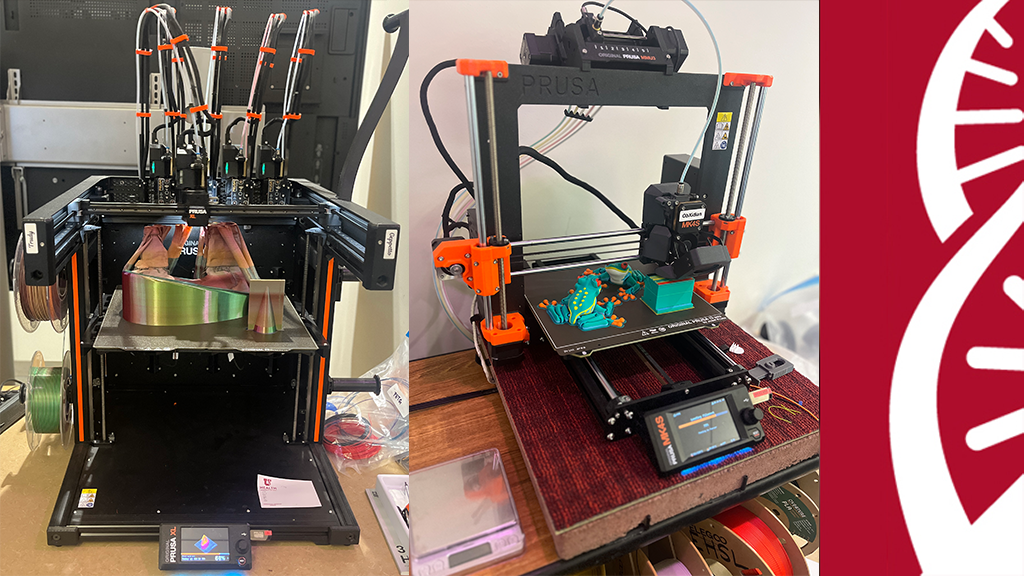Established through the Medical Library Assistance Act of 1965, the Network of the National Library of Medicine (NNLM) steadily works towards advancing the progress of medicine and improving public health by (1) providing all U.S. health professionals with equal access to biomedical information that allows them to have the most up-to-date information to provide care to all Americans and (2) improving the public’s access to information. With competitive funding through the National Library of Medicine (NLM), these efforts are administered and carried out through seven Regional Medical Library (RML) offices strategically distributed throughout the U.S. Each RML is designed to provide free health information access services to U.S. libraries and information professionals, who in turn use it to improve their knowledge and skills needed to expertly assist their communities to make informed health decisions. To reduce duplication of effort, NLM also funds several offices and centers specifically designed to support the training, web-services, data, public health collections, and evaluation needs of librarians, health care professionals, and the public

NNLM at the University of Utah – For more than 22 years, the Spencer S. Eccles Health Sciences Library (EHSL) has an established history of service to our assigned states as the Regional Medical Library (RML) for Region 4. For the past 14 years, EHSL has also effectively served as the National Training Office (NTO), which serves the training coordination needs for all RMLs, Offices & Centers, and the public across all 50 states and territories.
Through agreement with the National Library of Medicine to host the RML and NTO, the project brings an average of $2 million in direct program funds and more than $460k in indirect funds per year to the University of Utah. It focuses support for library and information professionals who serve a wide range of individuals and organizations from general health information consumers to biomedical researchers and those working in health-care professions. This report primarily covers the current performance period – May 1, 2024 to April 1, 2025 – (aka Year 4), which is in its fourth year of a five-year grant cycle.

NNLM Region 4 – The main work of Region 4 includes (1) community engagement & outreach, (2) training & education, and (3) funding for small projects throughout our nine Rocky Mountain and desert states spanning from the Canadian to the Mexican borders. Our work is primarily in service to NNLM Members, which are mostly made up of information professionals and librarians working in various types of libraries. (e.g. health sciences, academic, hospital, public, special, etc.). NNLM also works closely with public health educators, community-based health organizations, nurses, physicians, and other care team professionals. Our engagement with a broad range of professionals is how NLM programs and services reach the public.
Community Engagement and Outreach -The aim of our community engagement & outreach activities is to bring awareness of NLM and NNLM products and services, which consist of free and easy ways to access reliable health information important to healthcare workers and the public. Nationwide, there are 7,403 current NNLM members with 544 (7.3%) current members in Region 4. We have about a 2.3% annual growth rate of new members. The low membership percentage is explained by Region 4 being made up of rural communities with few large population centers. The combination of rural and urban presents challenges and opportunities for how we engage with our communities, most of which have poor access to healthcare, public services, and utilities.

In our efforts to create a sense of community, we focus our efforts on digital outreach and presenting at local and regional professional conferences. We are prolific in publishing health information access related news through our Blog posts and weekly Newsletter. Since May 2024, we published over 90 blog posts and 30 newsletters that reach 470 subscribers. We also produce live webinars 5 to 6 times per year, covering a wide range of health information topics. In Year 4, we had over 500 live attendees and twice this number for people viewing the YouTube recordings.
Meeting people in person remains an important part of our community engagement & outreach strategy. Since May 2024, Region 4 staff presenting at over 30 local or regional conferences, where we connected with more than 1,200 people.
Training and Education – NNLM offers a variety of online, on-demand and in-person training opportunities to support professional development and continuing education for librarians, educators, and health professionals, which is coordinated through the NTO (See details below). Region 4 is one of seven regions that contribute to the National Training Program (NTP). Examining Region 4’s efforts supporting the NTP so far in Year 4, we have produced 31classes that had over 2,000 registrants. Topics included bioinformatics, biology, community engagement strategies, teaching information access to broad range of users (teens, non-English learners, seniors, etc.), artificial intelligence, evidence-based public health resources, and more.
Funding – Region 4 offers competitive awards as a mechanism for NNLM members operating in our nine-states to access funding for (1) Professional Development Awards so they may strengthen professional knowledge and experience in health data or health information access related services; empower libraries and other organizations to train staff in skills needed to deliver reliable health information; and build professional capacity, (2) Engagement & Outreach Awards assists in building local partnerships & collabora-tions to improve access to health information resources, and (3) Technology Improvement Awards that supports short-term projects, including technology improvements for the community so they may have improved access to health information.
Over the course of this current grant cycle, which began May 1, 2021, we have distributed nearly $741k to various communities throughout each of our nine states. For the upcoming performance Year 5 (May 1, 2025-April 30, 2026), we are processing 12 applications requesting $234.8k.
Example projects funded in Year 4, involve: 1) documenting the health information challenges for women with Mullerian Anomalies (Montana); 2) issues around data science & sovereignty for Tribal College Librarians (Montana); 3) connecting communities to health information via public libraries (New Mexico); 4) combining a love of physical fitness and love for reading in Tribal Lands (Wyoming); 5) introducing the benefits of community health workers in Southeast Idaho, American Sign Language Medical Terminology eBook (Idaho).

NNLM Training Office (NTO) – NTO supports the training and educational missions of the Network of the National Library of Medicine (NNLM). We deliver high-quality, innovative training to many types of audiences nationwide in support of the effective use of NLM information products and services. NTO is a key driver in the NNLM’s that aims to support a highly trained workforce working in biomedical and health information resources and data so they may improve health literacy and health outcomes through information.
Reach – Since May 2021, the NNLM Training Program has taught 782 classes, reaching over 102,000 registrants. Librarians from health, academic, and public libraries, public health professionals, educators, researchers from across the United States register for NNLM classes. NNLM educational opportunities aim to improve health information access and use, health literacy, and data literacy through outreach and education. We prioritize access to health information and data through National Library of Medicine resources, products, services, and initiatives.

As a funded program of the National Library of Medicine, all class materials and recordings are made available to benefit of the public. The NNLM YouTube channel makes available class recordings and has 6,250 subscribers, and 418,200 views since 2021.
Quality and Effectiveness – NNLM is the preeminent provider of professional development for medical librarians, enabling professionals access to free, quality, relevant classes. As our reach has grown, we have expanded the types of continuing education offered. These classes enable many types of health information professionals to keep current in their fields and renew certifications without incurring costs.
We now have classes available for:
- Continuing Nursing Education,
- Certified Health Education Specialists
- Certification in Public Health
NNLM classes are a required component of the Medical Library Association’s Data Science Specialization and Consumer Health Information Specialization.
NTO oversees the development and coordination of classes in the NNLM Training Program. Curricular materials are vetted for currency, accuracy, and accessibility. Class participants are extremely likely to attend additional trainings offered by NNLM (9.22/10) and extremely likely to recommend NNLM trainings to colleagues (9.11/10). Both scores far exceed averages in the training industry.trainings to colleagues (9.11/10). Both scores far exceed averages in the training industry.
Broad reach of effective, relevant classes on access to health information and data means health information professionals are better prepared to impact the health of their local communities

NTO personnel includes 4.5 FTE, with faculty nationally recognized in the medical library profession for publications, board appointments, journal editors, and other leadership positions.
Testimonials
I learned new ideas and skills for better programming. I received resources and learned so much more …, such as how to collaborate with others to bring programming and collections into our area. I reached out to a few of the scientists to receive information on some of their projects. After much discussion, we are collaborating with Parks Services to see what we can do to partner on some water issues. I want to be a part of a big change in our community.
Our NNLM funded project established the feasibility of expanding physician access to usable health information by means of a subsidized PubMed article delivery program. Feedback from registered physicians includes:
“THANK YOU for offering this service. My hospital cannot afford to subscribe to all these journals. This is a wonderful alternative.”
“This is fantastic and so easy to use.”
“This is a great program. Thank you for making it easy to stay current with new information.”
One of the participants in our funded project, “Mona,” struggled with high blood pressure, lack of mobility, and had balance issues. This was starting to create an isolation issue as it was easier for her to just stay home. After attending these classes for a few months, she had a check-up with her doctor. Her doctor was amazed at the difference in Mona’s overall health. Her blood pressure was down, her mobility was better, she was able to move quicker and get up and down from a chair easier, and her balance was greatly improved. Her doctor said “he was proud of her and to keep doing what she was doing.” She gave the library all of the credit!
This was perhaps the best CE I’ve been to this year. WOW, the work that went into this and the value to searchers / clinicians is amazing.
For my facility at VA Hospital St. Louis, I plan to use clinicaltrials.gov for the study and use during systematic reviews. I didn’t realize that was a feature, but now I do. It will be interesting to use this in any EBP study we have.
I plan to use information from this training to better use research information management system APIs and to try to create data visualizations related to research output. I also hope to use these skills to support local researchers.
For a public librarian, the ability to do more in-depth searches (or help patrons search) for information on drugs, their adverse effects, and their presence in clinical trials will probably be the most useful.
I’m a public health nurse preparing to introduce a new program within a couple of library systems incorporating multi-disciplinary team members to meet patron’s health needs. The list of resources is helpful, and I will be requiring those I hire to view this recording.










